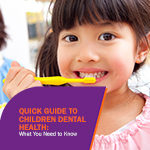Paediatric Dentistry
Good dental habits starts young. whether it’s their first visit, routine check-up or beyond. We’re here to help build a lifetime of happy smiles for your precious little tots.
Or call: +65 6734 9393
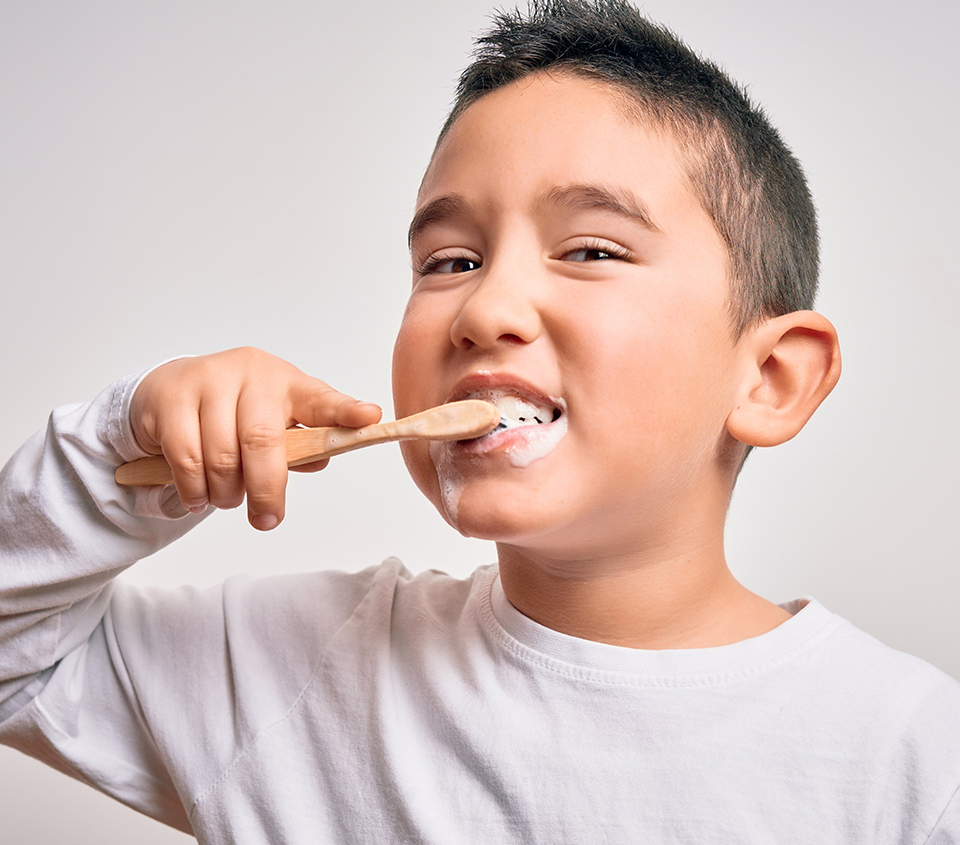
Start looking forward to the dentist early
It is a myth that children’s teeth are not important since they will fall out anyway. The early introduction of dentistry to young children is an important primer for the child; how he/she perceives and responds to dentists early will influence how they view dental care when they reach adulthood. By introducing dental care at an early age, it can help your child to understand the significance of taking care of their teeth as well as an easier acceptance towards dentist visits.
Maintaining our teeth is a lifelong commitment we should instill in children early in life. When children are equipped with proper life skills and educated on making the right dietary choices, we can be certain they will enjoy eating, smiling and maintaining good oral health throughout their lives.
At Specialist Dental Group, we ensure that each child is treated by a skilled paediatric dentist when they visit our clinic in Singapore.

What is paediatric dentistry?
Paediatric – or children’s – dentistry is one of the 7 specialty areas of dentistry in Singapore that focuses on dental care for individuals under the age of 18 years old – from babies and toddlers to teenagers.
A dental specialist in children’s dentistry is known as a Paedodontist (or a paediatric dentist) and is trained in all aspects of paediatric dental problems, behaviour management and even child psychology. A paediatric dentist is also trained in the care of special needs patients, including those with significant medical, physical or mental disabilities.
What is involved in paediatric dentistry in Singapore?
The paediatric dentist at our clinic in Singapore will bring your child through a few processes.
Ideally, your child’s first visit to the dentist should take place between the age of 1 and 2 years old. It is important that the child views a trip to the dentist as something routine that everyone in the family does to maintain healthy gums and a good smile, and not as an event to be feared. You can start to introduce your child to the dentist by bringing him or her along with you (and other family members) for your own dental check-ups. Let them watch the procedure and ask questions.
Should you have any anxiety, try not transfer these negatives emotions to your child and refrain from using the dentist as a threat (e.g. “if you eat too many sweets, you have to see the dentist” or “if you do not brush your teeth properly, the dentist will scold you”) as this will set up the dental visit as a negative experience for the child.
Schedule the first visit when there is no major treatment to be done. If a problem does arise in the future, you have the contact details of a dentist your child is familiar with on hand. When the first visit is made when your child is in pain and more extensive treatment is required, dental visits may become associated with pain or discomfort.
It is also a good idea to schedule the dental appointment when the child is rested and not hungry. The appointment will then be much smoother.
During the first visit, it is important for your child to feel comfortable with the clinic environment and our dental specialists/ dentists. Thus, our dental specialists/ dentists will normally start conversing with your child before starting any treatment. He or she will then start with an oral examination before deciding if is there is a need for x-rays.
If necessary, our dental specialists/ dentists will discuss any treatment with the parents. Otherwise, a simple cleaning may be carried out to reinforce a positive attitude towards the dentist.
The first appointment will take approximately 30 to 45 minutes. However, each child is different and some children will take a longer time to get used to the dental clinic environment than others.
During the visit, our dental specialists/ dentists will also discuss good oral hygiene habits, suitable tooth friendly diets and unfavourable oral habits with the parents.
Children’s teeth, like adults’ teeth, require maintenance. This means flossing, brushing and regular dental check-ups and maintenance every 6 months.
How much does Paediatric Dentistry procedures in Singapore cost?
Wondering if Medisave can be used?
Yes it may be applicable in certain situations, depending on the dental procedure involved. Please check with our friendly colleague for more information.
For Singaporeans and permanent residents of Singapore, the Baby Bonus may be used for dental treatment.
Meet our paedodontist
Our resident paedodontist is available for an appointment on Wednesdays and Fridays. We understand that might be hard to fit into your schedule. Alternatively, you can consider consulting with our team of dental specialists. They are familiar with working with little tots too.

Dr Steven Soo
Field
Prosthodontics
Training
UK
Qualified since
1989
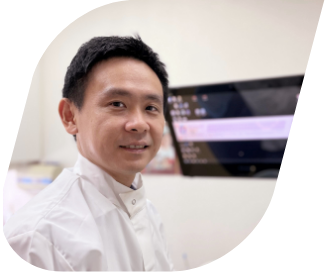
Dr Tan Kian Meng
Field
Prosthodontics
Training
Singapore, USA
Qualified since
2005
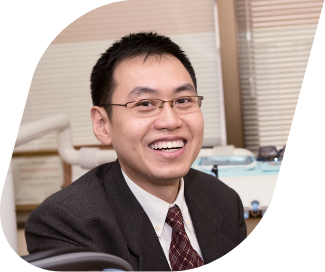
Dr Edwin Tan
Field
Prosthodontics
Training
Singapore, USA
Qualified since
1989
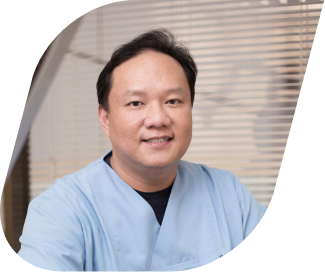
Dr Ho Kok Sen
Field
Oral & Maxillofacial Surgery
Training
Singapore
Qualified since
1997
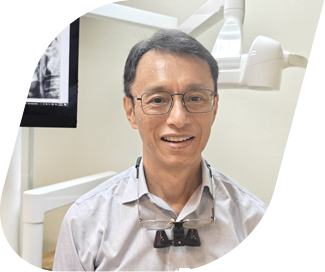
Dr Ansgar C. Cheng
Field
Prosthodontics
Training
Hong Kong, USA
Qualified since
1990
Frequently asked questions
Why should my child see a paedodontist?
Specially trained
A paedodontist has special training in the dental management of children (from infants to those under 18 years old). They are also trained in the care of special needs patients including those with significant medical, physical or mental disabilities.
Maintenance of primary teeth
A paedondontist places significant importance on the maintenance of primary teeth and preventing tooth decay. They will monitor the growth and development of the dentition and jaws. This will help in preventing, and/ or intercepting any abnormal habits and plan for any correction of deviations from normal growth in the future.
Preparation for eruption of adult teeth
Primary teeth are important for chewing, speech and appearance. They are also important for holding the space in the jaw for the eruption of permanent teeth. If baby teeth are decayed or lost too early, the neighbouring teeth will drift into the extra or empty space. When the adult teeth develop later, they will grow crooked, affecting appearance and function.
What are common dental problems in children?
Some common dental problems in children are bottle tooth decay, thumbsucking and teeth grinding.
What is bottle tooth decay?
When a baby sucks actively, the movement of the facial muscles and saliva results in a natural rinsing action which cleans his teeth. As a baby falls asleep while sucking on a bottle, the sucking becomes passive, and swallowing slows, causing the juice or milk to pool around the teeth forming a sticky film (plaque). The sugar present in the plaque is changed to acid. This results in decalcification and severe decay
What is thumbsucking?
Thumb, finger and pacifier sucking habits are common in babies and toddlers, but they cease on their own when the child is between 2 and 4 years old. If the habit persists over a long period of time or intensely, the child’s upper front teeth may begin tipping toward his or her lip. Teeth alignment, bite or the growth of his or her jaws and bones may be affected.
Teeth grinding
Teeth grinding during sleep is known as nocturnal bruxism. Usually, people who grind their teeth when sleeping do not remember doing so. In adults, this condition is known to be related to stress and facial pain. Children usually outgrow their nocturnal bruxism and suffer no short-term or long-term ill-effects. Up to this point, a predictable way to stop nocturnal bruxism has not been identified.
What is teeth grinding?
Teeth grinding during sleep is known as nocturnal bruxism. Usually, people who grind their teeth when sleeping do not remember doing so. In adults, this condition is known to be related to stress and facial pain. Children usually outgrow their nocturnal bruxism and suffer no short-term or long-term ill-effects. Up to this point, a predictable way to stop nocturnal bruxism has not been identified.
At what age should I start brushing my baby’s teeth?
Ideally, you should start brushing your child’s teeth when the first tooth is developed, which usually develops around six months of age.
My child complains that his teeth hurt. Is it caused by candies? What should I do?
There could be a range of reasons why your child’s teeth are hurting. Common causes of tooth pain include cavities, growing teeth or improper brushing. Eating candies in excess can cause tooth decay, especially sour food and candies which will strip away your tooth’s enamel. If the pain worsens or persists for prolonged periods of time, it is highly recommended to bring your child for a dental appointment.
How old should my child be for her first dentist appointment?
It is recommended to bring your child for their first dental appointment at the age of one or even earlier. This will help your child to feel comfortable and grow accustomed to dental checkups while instilling the importance of maintaining good oral hygiene.
Since my baby teeth will inevitably fall in the future, why do I need to take care of them?
While it is true that baby teeth will eventually fall, it is important to take good care of them in order to prevent tooth infections or decay which can hinder the development of new teeth and cause long term damage.

